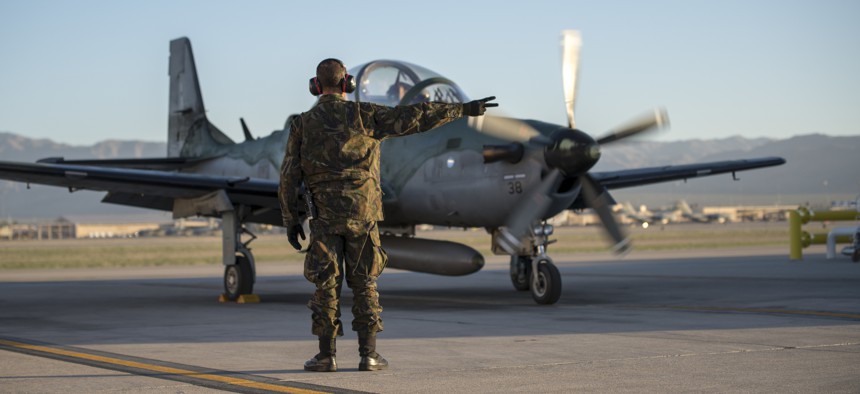
1st Sgt. DeBarros, a crew chief with the Brazilian Air Force, goes over pre-flight checks during Green Flag-West 19-8 at Nellis Air Force Base, Las Vegas, Nevada, June 8, 2019. Master Sgt. Joshua C. Allmaras/U.S. Air National Guard
Lawmaker Threatens to Give the Next Attack Plane to the Army
Tired of USAF slow-rolling, Rep. Michael Waltz has already spearheaded legislation allowing SOCOM to seek light attack aircraft.
Frustrated by the U.S. Air Force’s slow fielding of propeller-driven attack planes to support ground troops, one lawmaker raised the possibility of putting the project under Army control.
“My frustration is almost palpable at why it is taking so long to get this platform out to where the warfighters need it,” Rep. Michael Waltz, R-Fla., said Wednesday at a Mitchell Institute event.
The House has already given U.S. Special Operations Command the authority — if not yet the appropriations — to buy such planes. But Waltz said the need is so great that perhaps the Army should also be given such authority.
Over the past 12 years, the Air Force has waffled about whether it wants propeller-driven planes. Advocates have long argued that they are far cheaper to buy and operate than gas-guzzling combat jets, yet can carry the same types of smart bombs, missiles, and rockets. Opponents say they are too easy to shoot down, particularly by sophisticated adversaries.
But Waltz said battles against extremists are not going away.
“Whether it’s Africa, the Middle East, South Asia, South America, we are going to be engaged with our local partners on the ground in low-intensity conflict, I think, for the foreseeable future,” he said. “We are in a generational war against extremism. To that end, we can’t shift too far away from our counterterrorism mission toward near-peer competition.”
Waltz, a former Green Beret, believes it’s time to jumpstart acquisition of light attack aircraft. Frustrated with the Air Force’s waffling, he co-sponsored the legislation that would allow USSOCOM to ask Congress for money to buy the planes. That legislation is part of the House’s version of the 2020 National Defense Authorization Act, which will eventually need to be reconciled with the Senate’s own version.
In the meantime, Waltz is trying to signal to the Air Force just how serious he is.
“If we can’t move this program forward, then perhaps we need to explore if the Army needs that authority,” he said.
Right now, the Air Force is planning to buy two types of light attack planes: the A-29 Super Tucano, made by Embraer and built in the United States by Sierra Nevada Corp., and the AT-6 Wolverine, made by Textron’s Beechcraft. The plan is to buy at least six aircraft, and base them at Nellis Air Force Base in Nevada and at Hurlburt Field in Florida. The planes at Nellis would be used for training while the ones at Hurlburt would be used in combat air advisor missions.
Asked when these planes might arrive at the bases, Air Force spokesman Capt. Cara Bousie said she had no date.
The U.S. Navy and the Air Force spent the early part of the decade experimenting with the A-29 Super Tucano and Vietnam-era OV-10 Bronco as part of the Imminent Fury and Combat Dragon projects. The planes were used in combat operations in theMiddle East and Africa. More recently, the Air Force has been testing the A-29 and AT-6 in a series of experiments that began in 2017. A naval aviator died during those trials when his A-29 crashed in June 2018.
In July, the Air Force asked lawmakers to shift $156.7 million to the effort. On Tuesday, the Senate Appropriations’ defense subcommittee approved $210 million for six light attack planes in its edit of the appropriations bill.
Phillip Clay, a former Navy test pilot who participated in the Imminent Fury and Combat Dragon projects said the military needs “at least a wing” of these types of planes.
“I believe the mission they would conduct would be beyond just special operations missions,” Clay said at the event Wednesday.
It would not be unprecedented for the Air Force turn some planes over to the Army. In 2013, the Air Force gave Army Special Operations Command some relatively new C-27J Spartan cargo planes that it no longer wanted.
NEXT STORY: The Challenge of Managing Up







